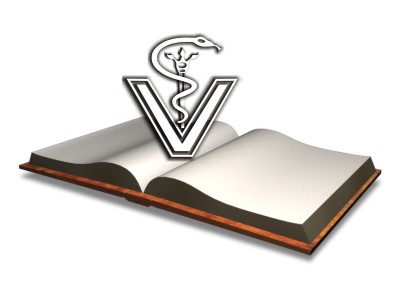Socialization of Veterinary Act Draft
 To socialize the Veterinary Act Draft developed by the PB PDHI (Indonesian Veterinary Medical Association) Workgroup, which will be the legal foundation of the veterinary profession, the Department of Animal Disease Science and Veterinary Public Health of the Faculty of Veterinary Medicine of Bogor Agricultural University in collaboration with the PB PDHI Workgroup and Center for Indonesian Veterinary Analytical Studies (CIVAS) has conducted a Veterinary Act Draft Socialization. This socialization was performed on August 3rd, 2007 at campus of the Faculty of Veterinary Medicine of Bogor Agricultural University in Darmaga, Bogor.
To socialize the Veterinary Act Draft developed by the PB PDHI (Indonesian Veterinary Medical Association) Workgroup, which will be the legal foundation of the veterinary profession, the Department of Animal Disease Science and Veterinary Public Health of the Faculty of Veterinary Medicine of Bogor Agricultural University in collaboration with the PB PDHI Workgroup and Center for Indonesian Veterinary Analytical Studies (CIVAS) has conducted a Veterinary Act Draft Socialization. This socialization was performed on August 3rd, 2007 at campus of the Faculty of Veterinary Medicine of Bogor Agricultural University in Darmaga, Bogor.
Speakers in the event were Dr. drh. H. Soehadji whom presented Strategic Analysis of the Veterinary Act Draft; drh. Dr. Mangku Sitepoe whom presented Flashback of UU No. 6/1967; and drh. Tri Satya Putri Naipospos, MPhil, PhD whom presented the Materials of the Veterinary Act Draft. Also attending the event was the General Chairman of PB PDHI drh. Wiwiek Bagdja and Dean of the Faculty of Veterinary Medicine of Bogor Agricultural University Dr. drh. H. Heru Setijanto. The discussion was moderated by drh. Olan Sebastian, MM. and Dr. drh. Wayan T. Wibawan, MS.
In her opening speech, drh. Wiwiek Bagdja stated that materials concerning the Veterinary Act must also be given to colleagues at campus. If the colleagues at campus do not understand the mechanisms of the legal foundation, then what use is the legal status? According to drh. Wiwied Bagdja, challenge for the veterinary profession in the future is particularly concerning policies of the Minister of Agriculture and government regulations on the function of veterinarians in the society and its environment dialog with the House of Representatives, and she also wished for a particular act for the veterinary profession as presented by PDHI.
The discussion was interactive and participants were asking questions very actively. Some of the questions asked in the socialization were: Berry Prima (Association of Indonesian Veterinary Students of the Faculty of Veterinary Medicine-Bogor Agricultural University) asked whether Staatsblads is still in place, if it is then why is it not implemented, and what are the difficulties in animal disease eradication (especially zoonoses). Dr. drh. Mangku Sitepoe answered that the government does not know that Staatsblads is still viable, so it is not implemented. Staatsblads lifted were only UU No. 16/1992 about quarantine, but not on animal health. Drh. Soehadji stated that animal health is still approached through agribusiness because it is part of production and culture. The approach should be more of animal health than animal disease. Because of globalization in Indonesia, through the Sanitary and Phyto-Sanitary (SPS) agreement, animal health must be separated from the livestock agribusiness system (Sisagrinak) and transformed into a national veterinary system (Sisvetnas) which will work together, side by side, and in synergy with the livestock agribusiness system.
Also in the discussion, drh. Bachtiar Moerad recommended to the chairman of PDHI that drh. Soehadji’s material on the Analysis of the Veterinary Act Draft should be presented to the House of Representatives.
drh. Soehadji explained that there are 3 Steps in the Act Draft, which are:
1. Draft formulation
- Team of the Ministry of Agriculture 2002 à Revision of UU No.6/1967
- Team of PDHI 2005 à Revision and Reposition of UU No.6/1967
2. Document development
- Team of the Ministry of Agriculture à Revision of UU No.6/1967
- Team of PDHI à proposed Reposition of UU No.6/1967
1. The General Chairman explained why Revision (and Reposition) is necessary
2. Strategic analysis
3. Develop the concept of the Veterinary Act Draft
3. Legislative
- UU No.6/1967 (animal husbandry and animal health)
- Proposed the Veterinary Act Draft initiated by members of the House
Drh. Suli asked is it not better to also regulate about the feed, specific conservation of domestic animals (for example the Balinese cattle), punishment, PPNS, and veterinary police? Drh. Tri Satya Putri Naipospos, MPhil PhD answered that feed supervision is in animal feed guarantee and conservation is not only of wild animals but also domestic animal. Animal welfare, veterinary authority, and veterinary equipments are already addressed in the Veterinary Act Draft; and sanction has already been regulated by the Ministry of Agriculture (5 years maximum), Animal Health System (Siskeswan), and the Veterinary Statutory Body (Badan Otoritas Veteriner).
There was also a recommendation from drh. Fajar Satrija regarding a Draft that addresses animal welfare, veterinary authority, GMP, feed formula, veterinarian certificate, veterinary equipments, and supervision of medication tools.
Drh. Abdul Rahman questioned about hearing of the Draft in the House of Representatives and realization of the Directorate General of Veterinary which has been approved by the Ministry of Agriculture. Drh. Wiwied Bagdja answered that hearing at the House of Representatives has been done and the Directorate General of Veterinary should be veterinarian-based in decision making.
Last was drh. Hamdi questioning whether foreign veterinarians should meet the same specifications as local veterinarians. Drh. Tri Satya Putri Naipospos MPhil PhD answered that foreign veterinarian practitioners are regulated in the Veterinary Act Draft, they must follow the regulations on practices and must oblige to the agreement between both countries.

